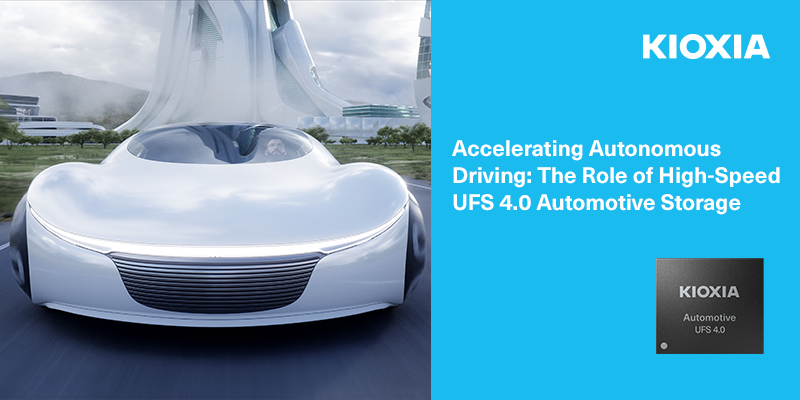
The ever-increasing amount of data being used by vehicles is forcing the automotive industry to undergo a transformation and take on an entirely new narrative – with the evolution of autonomous driving technology playing the main protagonist.
This avalanche of data being created needs to move back and forth over the vehicle network - requiring high-performance storage that can cope with the reading and writing of it. The automotive environment also presents unique challenges, such as temperature variations and vibration.
To address these demands, KIOXIA has developed automotive storage that complies with the latest Universal Flash Storage (UFS)1 4.0 standard. The robust design of UFS ensures seamless operation under demanding conditions, making it an excellent storage solution for the data-intensive processes that power autonomous driving.
We recently worked with EE Times to delve deeper into how the rapid advancement of storage solutions, particularly UFS 4.0, is pushing the boundaries of what's possible on the road. The article underscores the pivotal role of storage in the automobile.
Let’s take a look at what a storage device is tasked with in an integrated automotive system:
- Data Logging: Storage devices are used to log data generated by various sensors and systems within the vehicle, including information about engine performance, driving conditions, and more.
- Entertainment Systems: Modern vehicles often come equipped with advanced infotainment systems - the storage device stores media files and other content.
- Navigation and Mapping: The storage device stores mapping and navigation data, enabling GPS-based navigation systems to function.
- Vehicle Configuration and Settings: Various settings and configurations for the vehicle's systems and components are stored in the storage device including preferences related to driver profiles, climate control settings, seat positions, and more.
- Diagnostic Information: The storage device holds diagnostic information and error logs. This data is crucial for service technicians when diagnosing and troubleshooting issues with the vehicle.
- Driver-Assistance Systems: Vehicles with advanced driver-assistance systems (ADAS) generate and store data related to sensors, cameras, and radar inputs. This information is crucial for features such as adaptive cruise control, lane-keeping assistance, and collision avoidance systems.
Ready to learn more about how KIOXIA is driving the future of automotive applications forward? Click here for the complete EE Times article.
Notes:
1Universal Flash Storage (UFS) is a product category for a class of embedded memory products built to the JEDEC UFS standard specification. Due to its serial interface, UFS supports full duplexing, which enables both concurrent reading and writing between the host processor and UFS device.
All other company names, product names and service names may be trademarks of their respective companies.
Disclaimer
The views and opinions expressed in this blog are those of the author(s) and do not necessarily reflect those of KIOXIA America, Inc.